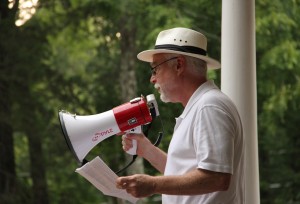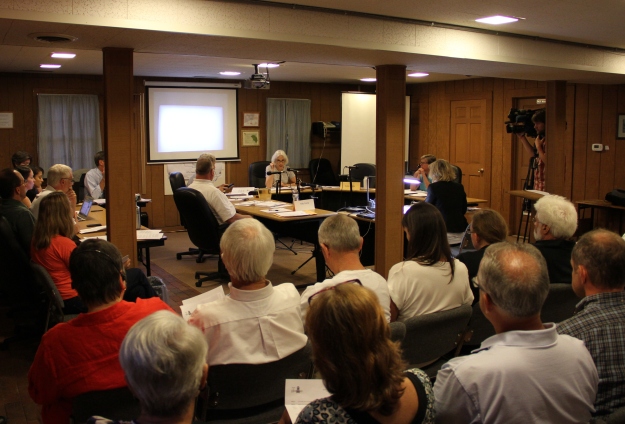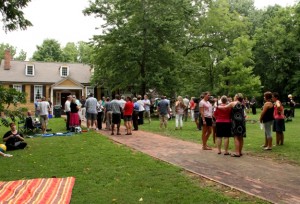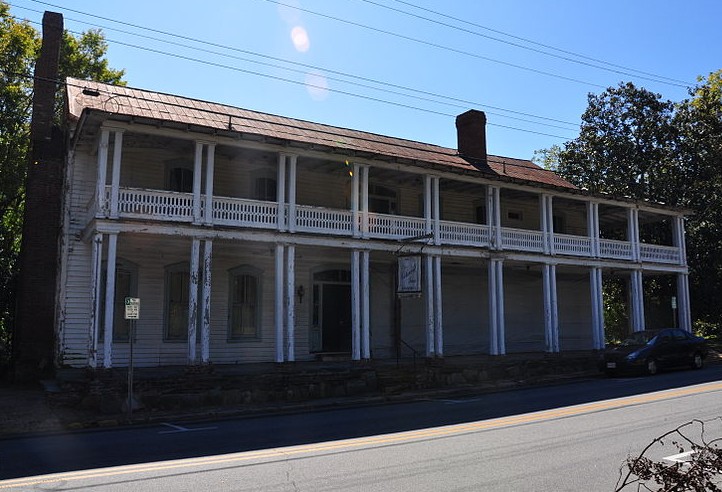With one member recused, the Hillsborough Historic District Commission unanimously denied the Colonial Inn’s owner the approval he sought to demolish the building.
Citizen opposition to losing the 176-year-old building was overwhelming at Wednesday night’s cramped meeting in the tiny Town Barn – and that was expressed by about 100 folks outside on the lawn, too.
“I grew up in Hillsborough,” said Kay Stagner, whose family now lives in Efland. “And I grew up going to the Inn – The Colonial Inn on Sundays for dinner. And I had my wedding reception at The Colonial Inn. I’ve been to Christmas parties and retirement parties, and it’s a part of my past, and my experience, just like, probably, most people here.”
The Stagners regularly visit Hillsborough for shopping and dining. On Wednesday evening, Kay and her 13-year-old daughter Hannah sat together on a blanket on the lawn of Hillsborough’s Town Hall, to join a demonstration of around 100 people opposed to the demolition of the Colonial Inn at 153 West King Street.
Some of the young children running and playing on the lawn were even dressed in 19th-century-style clothes for the occasion.
The rally began an hour before a meeting in the Town Barn, where members of the Historic District Commission would decide whether the dilapidated building would be spared against the current owner’s wishes.
Hillsborough insurance broker Chip Millard organized the rally quickly, on Facebook.
“Well I saw – I want to say on [chapelboro.com] – an article where there was a certificate of appropriateness to tear the Colonial Inn down,” said Millard. And you know, I’ve been following this story for the last 12 years, and it’s made me really mad.”

Hillsborough Mayor Tom Stevens addresses the crowd at a Town Hall rally to save the Colonial Inn. (SP Murray)
Right before the 7 p.m. meeting started, Hillsborough Mayor Tom Stevens greeted the rallyers with a bullhorn.
“As a Town Board member – and I think I speak for the entire Town Board – we do have tremendous confidence in the ability of our Historic District Commission,” he assured the crowd.
Inside the Town Barn, there’s only enough room for about 20-to-30 spectators, and it was packed. Some of the citizens who were there to speak against Colonial Inn owner Francis Henry’s application to tear the building down were actually called in from outside when it was their turn.
With the exception of Henry, who purchased the Inn 13 years ago, nobody spoke up for his request. Citizens have long complained about the run-down condition of the building since Henry bought it, and the Town of Hillsborough has taken several actions against Henry for non-compliance with repair orders.
Henry spoke first at Wednesday’s meeting. After requesting that a TV camera be moved to the other side of the room, away from him, and asking Hillsborough Planner Stephanie Trueblood to explain the evening’s proceedings, Henry said that he was only asking for the right to demolish the Colonial Inn.
That didn’t mean he would actually do it, he said. He framed it as a matter of principle.
“This application is based on my belief that a homeowner has certain rights,” said Henry. “I always believed that.”
Eighteen people stepped up to the podium to express their disagreement with Henry’s position. One of them was Hillsborough District Commission Chair Mark Bell, who had recused himself from deliberating and voting on the Colonial Inn matter, because he’d been involved in four out of six unsuccessful offers, that he knew of, to buy the Colonial Inn from Henry.
Bell, like others, insisted that the run-down building is “redeemable.”
“I encourage the HDC to deny the application to demolish this historic structure,” said Bell. “A grassy lot means nothing to Hillsborough. The preservation of the Colonial Inn means everything.”
The remaining four voting members of the Commission agreed. Henry’s application was denied unanimously. Members said that Henry had failed to find a “viable alternative” to demolition.






Comments on Chapelboro are moderated according to our Community Guidelines